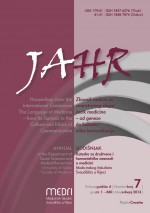Slijepi u islamu
Keywords:
islam, Božja objava, Predaja, komunikacija, slipi, slijepacAbstract
The attempt of this paper is to briefly emphasize the difference between the concepts of the blind and heartless (those with blind hearts) in the god’s revelation (the Qur’an ) and in islamic tradition (Hadith). The god’s Revelation and tradition as two basic sources of islam, and therefore islamic moral teachings, preach about blind people in a positive sense, but on the other hand, condemn those with blind hearts or people whose hearts are made of stone. The importance of nice a word in the islamic way of daily life and building interpersonal relationships is also underlined. especially with the blind people, who like every other hu-man being need a nice word. The first part of the paper is dedicated to the narratives of Jacub (Jacob) and Shuajb (Jethro), Prophets, who were blind in one period of his life. in addition, another person called abdullah ibn Umm Mektum, who was the Prophets friend and also a blind man, is mentioned. He had a special place in the sacred history, since he was the cause for reveling some verses (ajats) from Qur’an. The work puts accent on some mistakes in the translations of the Qur’an into Bosnian (croatian) language in regard to the word blind. The majority of translators made mistakes in the translation of the word. namely, translating blind as a man blind to heart. This paper also analyses the lists of traditions about the blind people. in the conclusion, there are stressed the importance of responsibility from the aspect point view of islam with the caution of using the word blind, both in speech and interaction.
Downloads
Published
Issue
Section
License
Authors who publish with this journal agree to the following terms:
- Authors retain copyright and grant the journal right of first publication with the work simultaneously licensed under a Creative Commons Attribution License that allows others to share the work with an acknowledgement of the work's authorship and initial publication in this journal.
- Authors are able to enter into separate, additional contractual arrangements for the non-exclusive distribution of the journal's published version of the work (e.g., post it to an institutional repository or publish it in a book), with an acknowledgement of its initial publication in this journal.
- Authors are permitted and encouraged to post their work online (e.g., in institutional repositories or on their website) prior to and during the submission process, as it can lead to productive exchanges, as well as earlier and greater citation of published work (See The Effect of Open Access).



